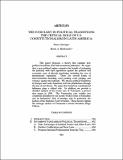| dc.description.abstract |
This paper proposes a theory that explains how political transitions deal with incumbent judiciaries. We argue that a new political regime compares the benefit of reshaping the judiciary with loyal appointees against the political and economic costs of directly interfering, including the cost of international reputation. There are several forms of interventionism including court packing, court purging, and violence against the judiciary. We discuss political transitions in Europe and Latin American civil law jurisdictions through the lens of our theory. We argue that American constitutional influence plays a critical role. In addition, we provide a detailed analysis of the recent case of Venezuela, a process that began in 1999. The Venezuelan case verifies two conditions identified by our model: weaker forms of formalism and an institution’s lack of prestige, and, in particular, the justices of the Supreme Court of Justice. These factors explain the strategic choices of Venezuela’s current President, Hugh Chávez. |

